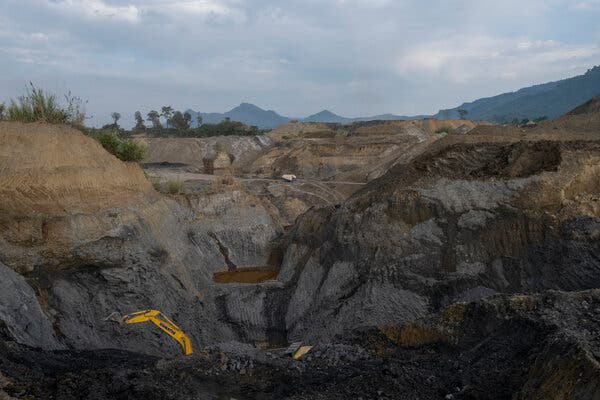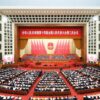OTING, India — Technically, there is no war anymore in Nagaland, but the peace does not feel certain, either. What the remote northeastern Indian state has is a lot of soldiers, keeping a heavy hand and provoking a rising anger among residents who say change is long overdue.
Those tensions boiled over in December near the hilltop village of Oting, when Indian Army Special Forces mistook ethnic Naga villagers for rebels and opened fire on a truck carrying them home after work at a coal mine.
Survivors say there was no warning before the bullets flew, killing six people. By nightfall, the death toll had climbed to 13 civilians and one army soldier, as an angry crowd of people — some armed with machetes — clashed with soldiers, who opened fire again.
Among the dead was C. Shomwang Konyak, the president of the village church’s youth group, who was doing seasonal work at the coal mine for about $15 a day. He was 32 years old, his father said.
“The Indian Army killed my son,” his father, Chemwang Konyak, said during an interview in his courtyard. “He was not an underground rebel, not an overground supporter. There is no movement of underground rebel cadres here.”
Nagaland, a state of more than two million people, was once a battleground, the site of a separatist rebellion that stretched for more than five decades. But a cease-fire was struck 25 years ago, and has mostly held since then. The area around Oting had been calm for years, local officials and residents say.
But a heavy military occupation remains, allowed under a special powers act that the Indian government has been reluctant to roll back. Residents complain that the act’s impunity for soldiers has made them abusive, and that the military presence has stunted local law enforcement and governance — and led to deadly mistakes like the one in Oting.
The killings have prompted widespread protests and cast new attention on the measure, the Armed Forces Special Powers Act, which was put in place in the 1950s when a newly independent India faced a wave of uprisings and insurgencies, particularly in the northeast.
Most of those have ended — or, as in Nagaland, have been calm in recent years. But the special powers act remains the law of the land in two full states and one territory, and in parts of two other states where there are similar complaints of hampered local governance and pervasive fear.
“There is no logic for this form of militarization in an area where you’re supposed to have a cease-fire and where you pretend that you have democracy,” said Sanjay Barbora, a professor with the Tata Institute of Social Sciences who has written extensively on the counterinsurgency efforts in the northeast. “It empowers everyone wearing the uniform and allows the army to do as they please.”
The people of Nagaland have been in a kind of limbo since 1997, when the cease-fire set in between separatist rebels and the military, but left both sides armed and holding turf.
Talks for a permanent peace deal started, but 25 years later, there is no final settlement. Rebel groups have not been quashed, but allowed to control fiefs as long as they do not target soldiers. Depending on where they live, residents can face harassment from both the military and the rebels.

JAMMU and
KASHMIR
CHINA
PAK.
BHUTAN
NEPAL
New Delhi
Oting
Dimapur
INDIA
NAGALAND
Kolkata
MYANMAR
Mumbai
Bay of Bengal
500 miles

JAMMU and
KASHMIR
CHINA
PAK.
BHUTAN
NEPAL
New Delhi
Oting
Dimapur
INDIA
NAGALAND
Kolkata
MYANMAR
Mumbai
Bay of Bengal
500 miles
“There are many factions in the underground, and they are also running their own government with impunity,” said S. C. Jamir, who was chief minister of Nagaland for 15 years over four terms. “The public remains mute on every issue because they are afraid of the gun culture.”
In Nagaland and other areas under the special powers act, the military still has permission to search, arrest and open fire without a warrant or charge, and soldiers have near-complete immunity from legal action.
While the armed forces in Nagaland have been carrying out significantly fewer raids and operations in recent years, residents say the refusal to do away with the special powers measure perpetuates an environment of fear and daily harassment that makes it to the news only when a deadly mistake occurs. Many described a sense of humiliation in being treated as second-class citizens, and constantly watched by an outside force not answerable to the local elected government.
“There is random frisking and searching taking place everywhere — without prior information they come, they raid,” said K. Elu Ndang, the general secretary of a body of local tribal groups in Nagaland. “It is very inconvenient to the public — it’s mental torture.”
The December killings in Oting reignited protests against the act, commonly referred to as AFSPA. Calls for its repeal have come from activists and peace marchers, but also from Prime Minister Narendra Modi’s allies in Nagaland, including the state’s chief minister. In late December, the Nagaland State Assembly unanimously passed a resolution calling for the repealing of the act.
The site of the killings, a narrow stretch of dirt track with bamboo forests on each side, has at once turned into a display of the perils of militarization and a protest camp against it. Burned down army vehicles are cordoned off by police tape. The ambushed truck is covered with bullet marks in the windshield and blood on the seats. The area is peppered with protest placards: “STOP KILLING INNOCENT PEOPLE,” read some.
Chongmei Konyak, 43, said his left foot was struck by a bullet in the violence after the initial ambush. He had served in the army for 15 years and was working in the coal mine that day.
“Why is the Indian Army killing innocent people in the name of AFSPA?” Mr. Konyak said from his hospital bed. “They are keeping the insurgency alive.”
Gen. Manoj Mukund Naravane, the Indian Army chief, has called the episode “highly regrettable” and said an inquiry was underway.
“Based on the findings of the inquiry, appropriate action will be taken,” Mr. Naravane told reporters this month.
There are disputes over why it has taken so long to reach a final peace settlement. One of the sticking points involves boundaries, with the Nagas wanting the incorporation of parts of territory that have been added to neighboring states. Such territorial disputes between northeastern states have recently resulted in deadly clashes.
While the Nagas have backed down from their demand for full autonomy, willing to share sovereignty and allow the central government control over some matters such as defense and foreign policy, some analysts see the Indian state’s slow response as a strategy of waiting the Nagas out. The rebel factions continue fighting over resources, and the older generation dies out.
G. K. Pillai, who was involved in negotiations while India’s home secretary from 2009 to 2011, said he had repeatedly recommended the repeal of the army’s special powers because Nagaland was “as peaceful, or more peaceful perhaps, than many places, including Delhi.”
Mistrust between the two sides could only grow if a final settlement drags on, in part because of the Indian government’s actions elsewhere in the country, Mr. Pillai said.
Mr. Modi’s government in 2019 unilaterally revoked the statehood of Jammu and Kashmir, another restive and disputed region with heavy military presence, and brought it directly under the central government without engaging with the local elected assembly. The political leaders who had over decades sided with the Indian republic in the face of militants and separatist groups were jailed or put under house arrest, while the military further strengthened its grip.
The unilateral move in Kashmir has the Nagas worrying that the Indian state could easily reverse any concession it makes, Mr. Pillai said.
“How can you take a decision which affects my sovereignty without my concurrence?” Mr. Pillai said. “They are re-evaluating this ‘shared sovereignty.’ ”
During the years of relative peace under the cease-fire, Naga youth have sought jobs in other parts of India. Now the coronavirus pandemic’s blow to the urban economy has forced a reverse migration. In Nagaland, many young men are returning to a home where years of calm have brought little development, but a delayed peace perpetuates military and rebel abuses.
“People are very clear that it is not a military issue,” Mr. Ndang, the tribal leader, said. “But if the present talks do not bring any settlement and solution to the problem, then the next generation would be a different movement.”
Hari Kumar reported from Oting, India, and Mujib Mashal from New Delhi.




























